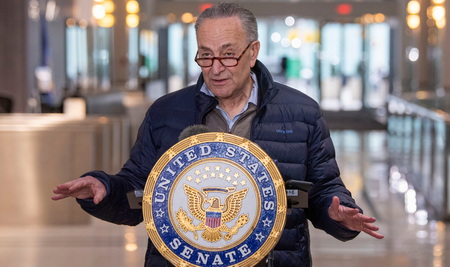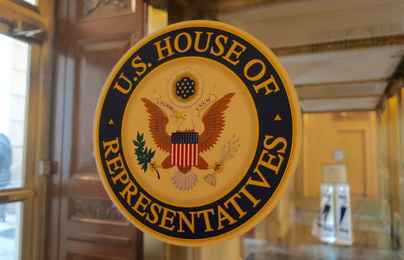
PoliticoPro reported today that Senate Majority Leader Chuck Schumer (D-NY), above, and Sen. Joe Manchin (D-WV) are grinding through talks about a scaled-back reconciliation package that may include provisions on climate, deficit reduction, and prescription drug costs.
Discussions & Deadlines
- The Senators met twice this week to discuss the contours of a potential trimmed-down alternative to the defunct Build Back Better Act before Sept. 30, when current budget protections for a party-line spending bill expire. (PoliticoPro, June 17)
- The Senate is scheduled to go on a two-week recess after July 24, then return for four weeks before the August recess.
- PoliticoPro also reported that Schumer is working with the Senate parliamentarian to pave the way for a possible July or August vote on such a bill. Under reconciliation rules, a legislative package would require majority approval in the evenly divided Senate, as Vice President Kamala Harris could potentially cast a tie-breaking vote.
- Schumer and House Speaker Nancy Pelosi (D-CA) met with President Biden on Wednesday to discuss “their plans for fighting the global problem of inflation that is affecting every major economy, such as bringing down prescription drug and energy costs…” according to a White House read-out.
- Pelosi commented after the meeting on negotiations about a reconciliation bill. “It’s alive. I’ll just say that.” (The Hill, June 16)
House Dems Push for Senate Progress

- On Thursday, 175 Democrats wrote to President Biden asking him to “reach a deal and sign into law as swiftly as possible a revised reconciliation package that includes the climate investments” previously passed by the House.” (E&E News, June 17)
- The House Democrats warned “the window to achieve a deal is rapidly closing, and so time is of the essence.” (CQ, June 16)
- In May, discussions between Schumer and Manchin were reportedly addressing a pared-down package involving $800 million to $1 trillion in revenue from a new minimum tax on large company profits and increased IRS enforcement. Half of these revenues would go to deficit reduction. (Wall Street Journal, May 28 and Axios, May 27)
The most significant portion of the moribund BBB Act’s proposed spending was focused on climate policies. The Roundtable on Nov. 16, 2021 sent a letter to congressional tax writers detailing five recommendations on green energy tax provisions affecting real estate that were part of the BBB Act. (Roundtable Weekly, Nov. 19, 2021)
# # #

